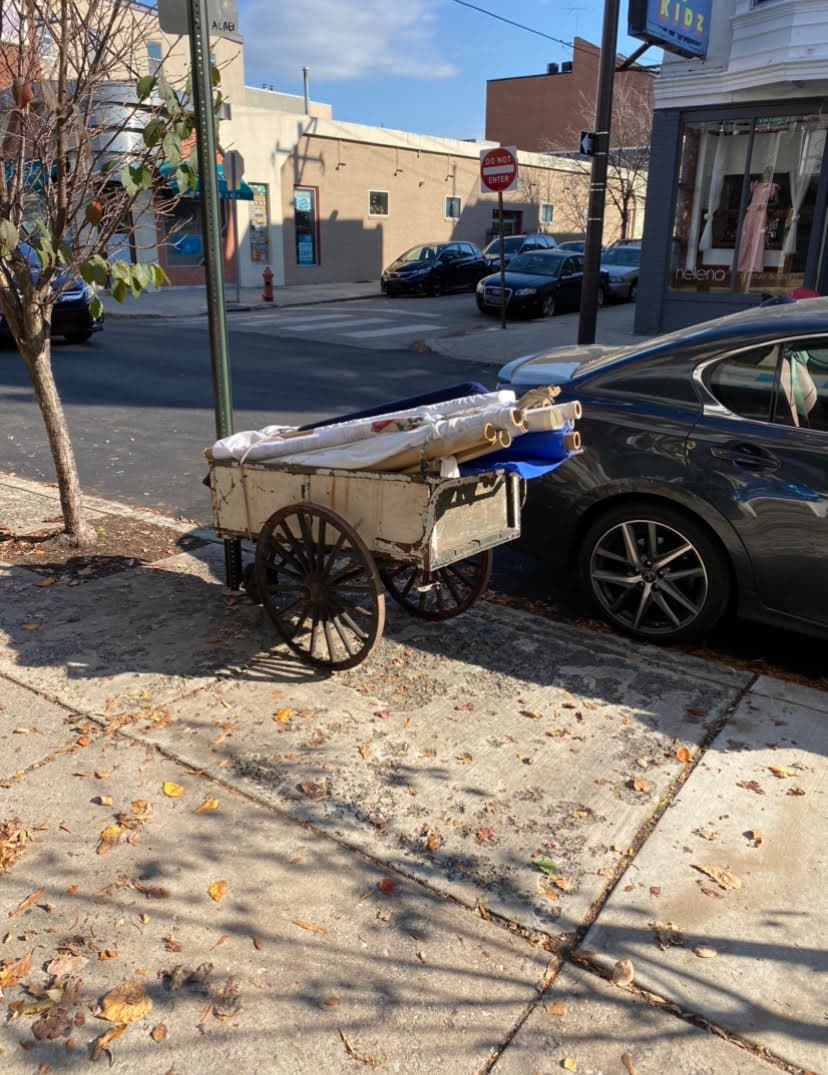Remnants

The 700th block in the pushcart era, circa 1920. Courtesy of Michele Winitsky Palmer.

Storefront of Maxie's Daughter. insert courtesy.
In 1955, pushcarts were officially outlawed. But despite the economic crisis dictated by War World II, South Fourth Street's businesses were thriving. One of them was Louis Winitsky's retail store, the building you're standing in front of. Louis Winitsky's daughter, Michele Winitsky Palmer, recalls working as a teenager in the family store. Louis Winitsky was a first-generation immigrant from Ukraine. He, like many other shop owners, was committed to being an American and creating a future for his family. He focused on the future, rather than the past, says Michele about her father. At the time of her adolescence, most families lived in the suburbs and commuted to the city to attend to their stores. Michele describes the essence of Fabric Row as intimate. Everyone knew everyone, just like in a small town. There were misunderstandings and fights but at the end of the day, everyone helped each other out. Louis Winitsky sold the store, Wintech Fabrics, which eventually became Maxie's Daughter. For many years, Maxie's Daughter displayed one of the last remaining pushcarts in the front window.

One of the last remaining pushcarts that used to be displayed outside of Maxie’s Daughter. insert courtesy
In 2022 the owner, Eric Trobman, was forced to shut Maxie's Daughter down. The spirit of South Fourth Street remains intact as it reinvents itself through time. What's the future of Fabric Row? As you head to the next stop, imagine what you would want for the neighborhood if you had family history here. Michele dreams of a Fabric Row museum established in the neighborhood, one that tells the story from the immigrant's perspective. Joel Spivak, a retired architect and artist, collects memorabilia and photographs of South Fourth Street. Just like Michele, Joel’s family used to own a business on Fabric Row, and like her, he wishes to open a physical museum dedicated to its history.
Citations
“Fourth Street.” n.d. Www.fabricmuseum.org. Accessed April 21, 2024. http://www.fabricmuseum.org/Fourth_Street_intro.html. Palmer, Michele. 2024. Review of Fabric Row Interview by Arianna Olivieri. Spivak, Joel. 2024. Review of Fabric Row. Edited by Arianna Olivieri. April 15. “The Generations Collide on Fabric Row.” 2016. Hidden City Philadelphia. June 3, 2016. https://hiddencityphila.org/2016/06/on-fabric-row-pushcarts-and-posh-boutiques-weave-history-with-vitality/. “Jqp/Jewish-Quarter.” n.d. Www.museumoffamilyhistory.com. Accessed April 21, 2024. https://www.museumoffamilyhistory.com/jqp-jewish-quarter.htm.
About the Guide
Arianna Olivieri
MA Museum Studies student at the University of the Arts, Philadelphia (PA)
Visit Arianna Olivieri's Site